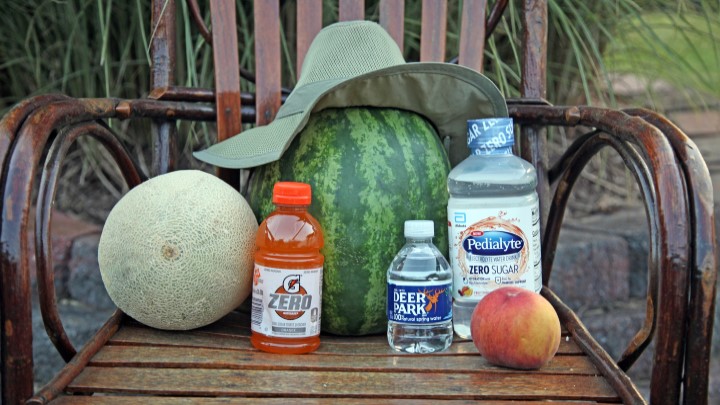
Dehydration is, simply, the removal of more water (and electrolytes) from our body than we take in. To stay healthy, we must keep our body in balance! There are many activities that can cause dehydration, and nobody is immune. Also, be aware that the very young and older individuals, especially those with certain medical issues, are especially susceptible.
The Problem
When we are involved in any activity, no matter the temperature, what we are doing at that time is what is on our minds. It’s easy to become distracted and not notice that we are losing fluid through perspiring and urination. I know this firsthand since I have done this. (Worst of all, I knew better, but what I was doing was my only focus as I worked.)
The problem is worse if we’re sick. Be aware that with a high fever, vomiting and diarrhea, we lose a lot of fluid and electrolytes, all of which are necessary to keep our bodies in balance. Here are some specific examples of why we need to replenish our bodies’ fluids.
Electrolytes
These by definition are solutions that conduct electricity by means of their ions. An example we all know is table salt or sodium chloride. When dissolved in water, it dissociates into positive sodium ions and negative chloride ions, which carry an electrical charge. This as well as other essential electrolytes (as potassium, calcium, magnesium, chloride, etc.) are needed by the body for cells to regulate various processes that keep our body’s ability to support life in balance. Lose too many electrolytes without replacing them and you’re in trouble.
Symptoms of Dehydration
The symptoms of dehydration are many, but you’ll notice that “thirst” isn’t on the list. That’s because thirst, your body’s natural reaction to dehydration, doesn’t set in until you’re already dehydrated. You may experience headache, dizziness, weakness, confusion, fainting, rapid breathing, heartbeat or pulse, dry lips and mouth, muscle twitching, lack of urination and dark, strong-smelling urine.
Prevention Through Fluids
Replenishing fluid through water consumption throughout the day is helpful. Remember to add electrolytes through drinks, such as coconut water or dedicated sports drinks. These all work together as long as they are consumed throughout the day. If you are playing or working hard and are constantly losing a lot of fluid, it may be worth looking into a specialty drink such as Pedialyte, which is an electrolyte-dense water drink.
Prevention Through Foods
Fruits and vegetables also contain fluids and electrolytes! One of the best to consume throughout a hot and dry day is watermelon. Others are strawberries, peaches, cantaloupe, celery, etc., all of which are beneficial and healthy.
Liquids To Avoid
You do not want to consume what is referred to as a diuretic. This is an agent that increases your excretion of urine, which obviously depletes the body of fluid. These include alcohol and caffeinated beverages, which can affect us on different levels due to our age, weight and health condition. Also, some individuals may be taking a prescribed medication, usually referred to as a “water pill,” which is designed to increase your excretion of urine. This is why when taking any supplement/medication, and especially when it was prescribed for a medical condition, check with your doctor. Here is where to get safe advice as to what you can safely consume in hot and humid working/play conditions.
A Good Approach to Prevention
When you know you will be out there when it is hot, dry and sunny, start by drinking at least 8-12 ounces of water before starting whatever activity. Also be aware that munching on fresh fruit and vegetables throughout the day can also help to replenish lost electrolytes and fluids. Then continue this regime on a regular basis throughout the day so you can keep track of what you consumed and when. Stay safe and healthy!






































